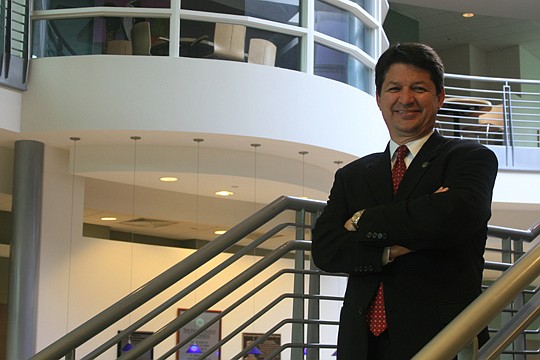
Jacksonville business executive Richard Sisisky says that when close friend Rick Mullaney had the idea of creating a local program offering master's degrees in public policy to emerging leaders, he was stunned to learn such an endeavor would be a first for Florida.
Less than two years later, Jacksonville University's Public Policy Institute is on a roll: 14 students are enrolled in fall classes and, this month, the institute hosted a major health care policy conference and a prestigious University of Notre Dame lecture on the national debt crisis.
Sisisky chairs the institute's 25-member nonpartisan Board of Advisers, whose diverse makeup of business and community leaders includes former U.S. Rep. Jason Altmire (now a Florida Blue senior vice president), former U.S. ambassador John Rood, Jacksonville Jaguars President Mark Lamping and nine other chief executive officers.
"In addition to training future leaders, we are becoming a central address for issues of consequence around the city and around our region," said Sisisky, president of the Jacksonville employee consulting firm The Shircliff and Sisisky Co.
Mullaney, a former general counsel for the City of Jacksonville, says as a private liberal arts university, JU is ideally suited to operate a public policy program.
Unlike an engineering degree, for example, which requires an engineering department, a public policy degree is interdisciplinary and requires faculty and courses from multiple departments and disciplines, including economics, political science, communications and philosophy, he said.
"In addition, a private university has the flexibility to create such a program and move quickly," Mullaney said, adding that JU's "top-notch" faculty is the institute's driving force.
"I hope the institute will help prepare a new generation of leaders in the public, private and nonprofit sectors and play a very constructive role in shaping the future of the region and the state," he said.
JU's master's in public policy degree is a two-year, 48-credit program that includes 10 core courses, an internship, and a two-semester capstone policy project.
Students meet the experiential learning requirement through study abroad, clerkships or a network of public, private and nonprofit organizations supporting the institute by providing internships.
The degree also may be combined with postgraduate degrees in law (a joint program with the Florida Coastal School of Law), business administration and marine science.
Bill Adams, professor of public policy and public administration at George Washington University in Washington, D.C., said Mullaney and JU are filling a critical void in Florida.
The United States has about 50 public policy institutes; the first was established in 1971 at Harvard University.
"Florida has a number of respected master of public administration programs, but it is quite astonishing that America's nearly third-largest state has been without even a single MPP (master in public policy) program," Adams said.
"A state government as big as Florida's will surely profit from locally trained public policy analysts with skills such as statistics, economics and program evaluation – and already familiar with the state's history, demographics, and political setting," he added.
Mullaney initially pitched his institute proposal in 2011 to then-Jacksonville University President Kerry Romesburg, who solicited and received buy-in from the university faculty and board of trustees. Among the trustees was then-PepsiCo consultant Tim Cost, who became JU's president in February.
"President Romesburg was immediately supportive and said he had been thinking about a center for public policy for many years, but had never found the right person to lead it," Mullaney said. "President Cost, who has a private sector background in public policy, is probably even more supportive."
JU's major responsibilities after establishing the institute in January 2012 were developing a curriculum, assembling the faculty and successfully pursuing Southern Association of Colleges and Schools accreditation for its new degree programs.
Meanwhile, Mullaney visited acclaimed public policy institutes at Harvard, Duke, George Washington, Georgetown and other universities, and began incorporating those institutes' best practices, including modeling Georgetown's annual policy forum.
A $152,000 Jessie Ball DuPont Fund grant awarded in December 2012 was a major shot in the arm for the program, as have been high-profile visits to the board of advisers' meetings by Florida Gov. Rick Scott, Attorney General Pam Bondi and House Speaker Will Weatherford, a JU alumnus.
In July, Mullaney began hosting "Policy Matters," a quarterly radio show on WJCT-FM 89's public affairs program, "First Coast Connect."
"I think any time you have a forum and a body that can give counsel on political direction and ideas, it is a good thing," said Jacksonville City Council President Bill Gulliford, a guest last week on "Policy Matters."
C. Daniel Rice, the institute's board vice chair, said the health care conference exemplifies the facility's early success and the opportunities available for it to help shape policy locally, regionally and statewide.
The conference brought together Florida legislative leaders, nationally renowned healthcare policy experts, and CEOs of hospitals, the insurance industry and business.
"While (the November forum) focused on Obamacare, which is a divisive political issue, the forum had many data-driven presentations that gave people an opportunity to understand the bigger issues of health care insurance, cost and access, and what Obamacare did and did not do to address these challenges," said Rice, Mayport Venture Partners' president and CEO.
Mullaney, a 58-year-old father of three, says his new career pursuit came with risks. What if the JU faculty resisted, accreditation couldn't be obtained, funding fell short, or no one enrolled?
"We thought we had a good plan going in, and I am very pleased with how far we have come in less than two years," he said.
Meanwhile, Mullaney says he is in a familiar situation in terms of job satisfaction.
"I think you are very fortunate if you get up every day and love what you do as I am," he said. "I am very blessed."